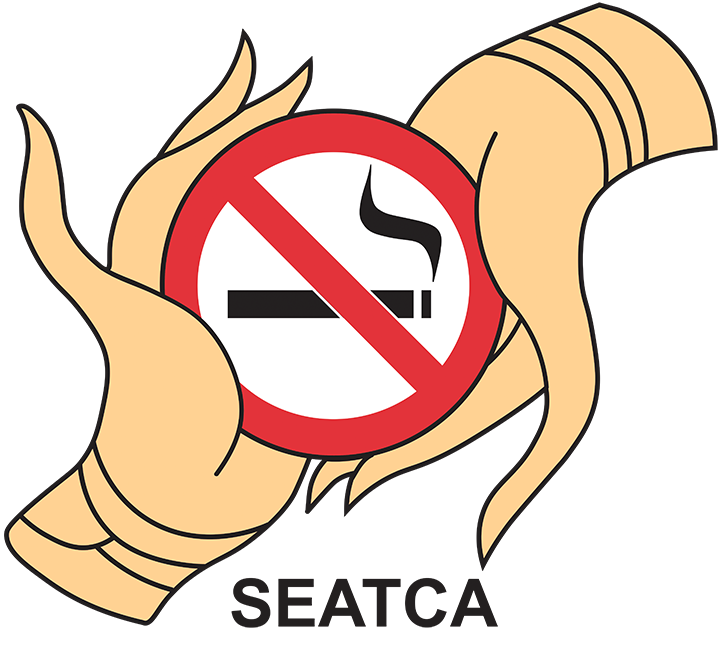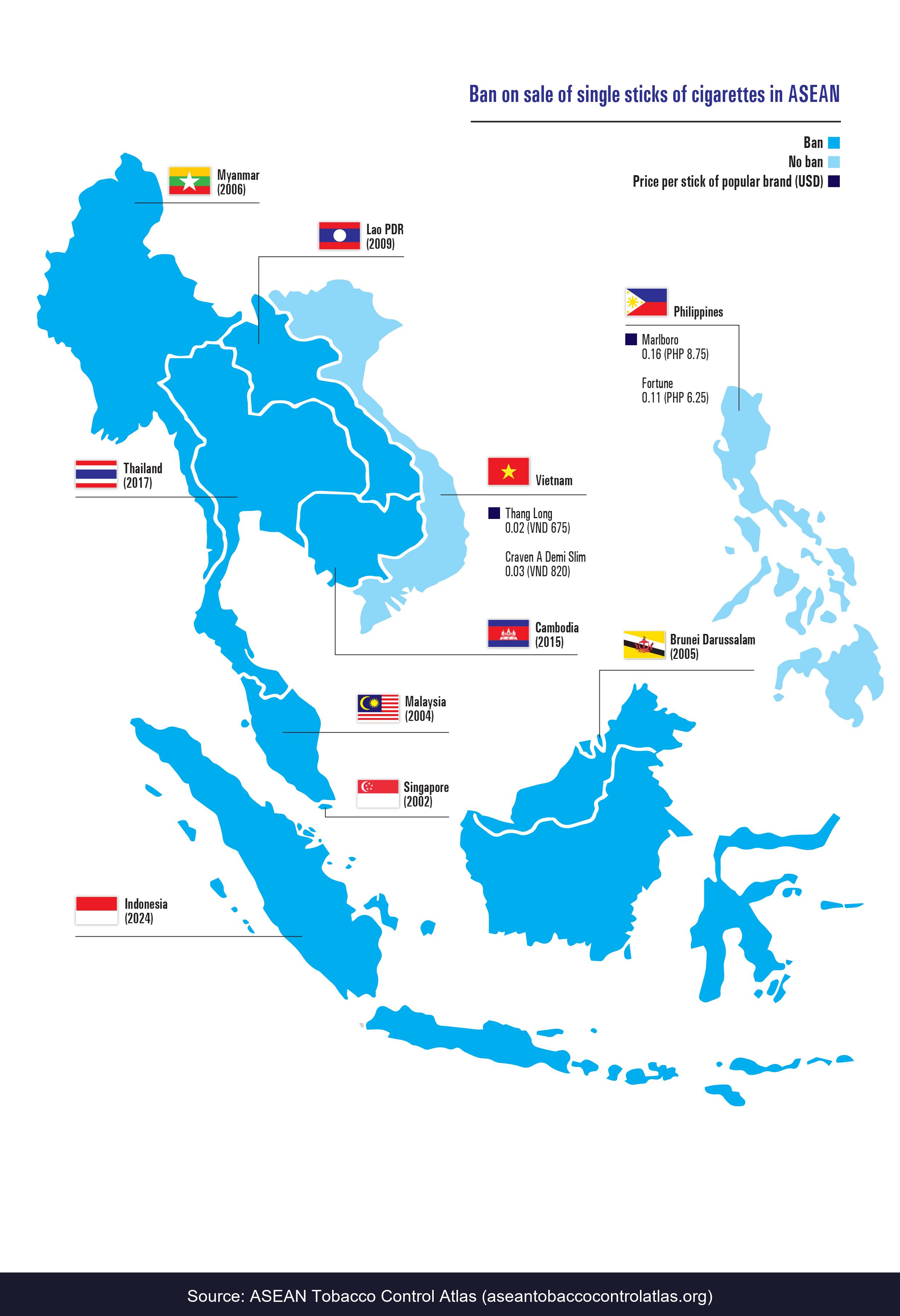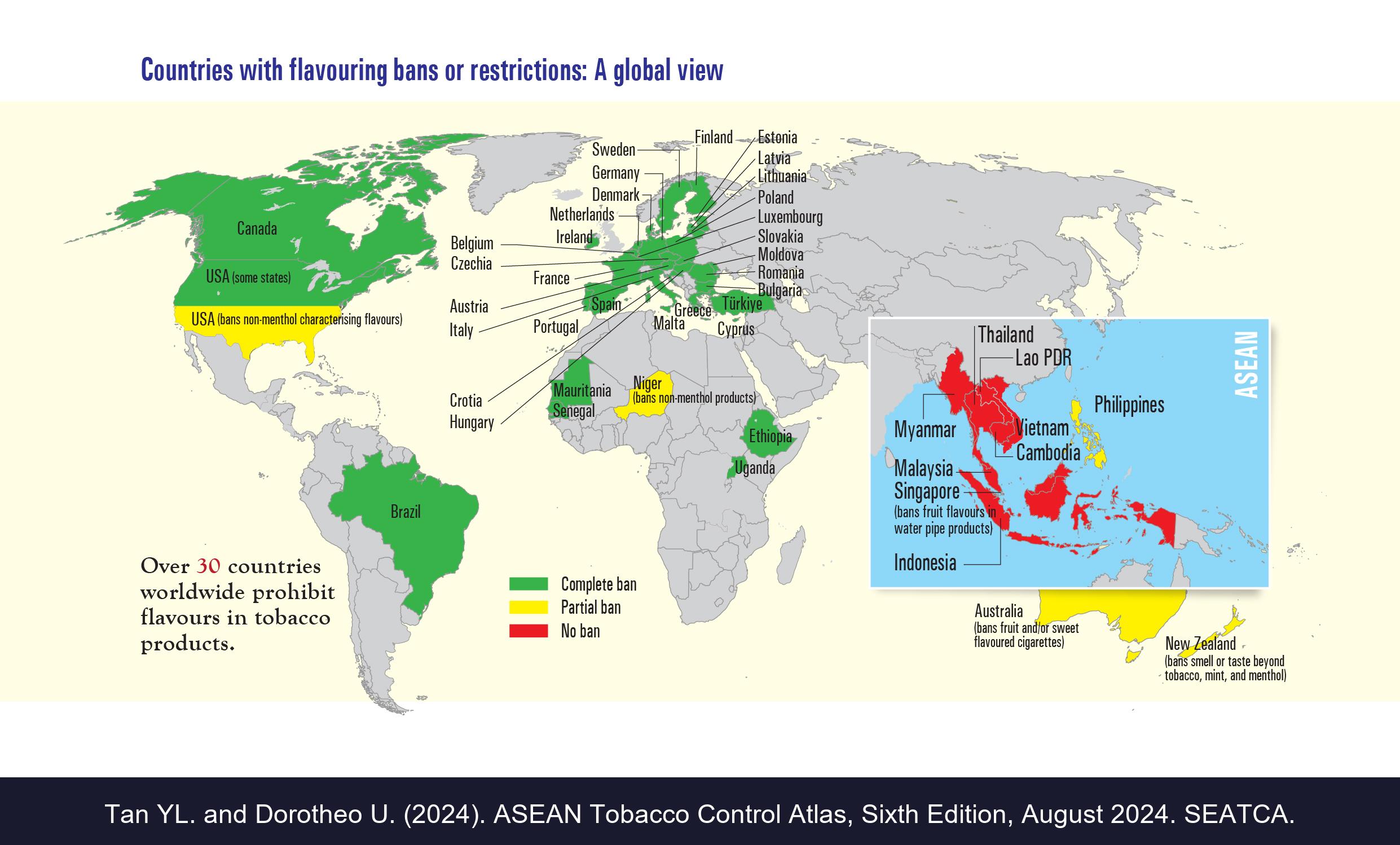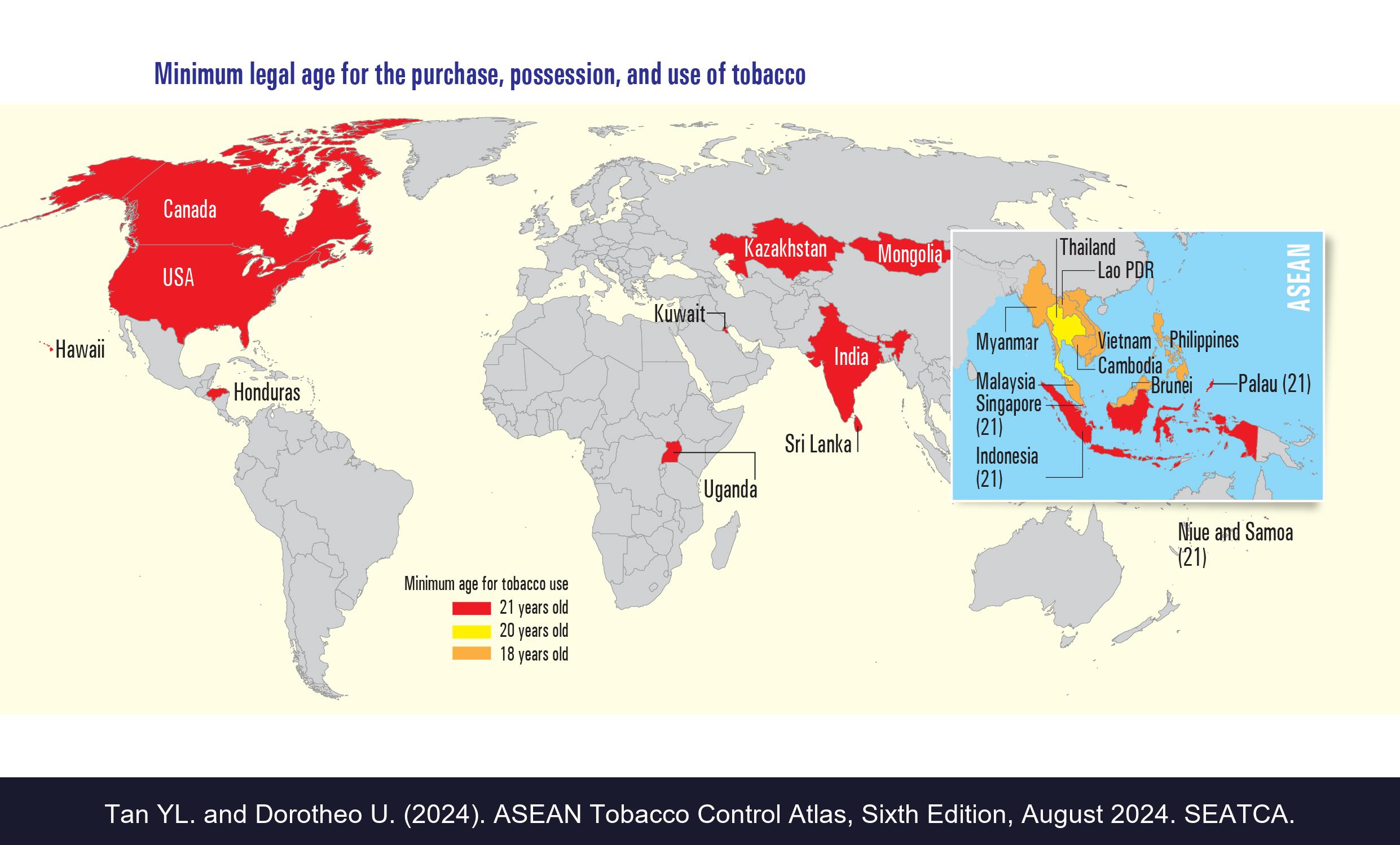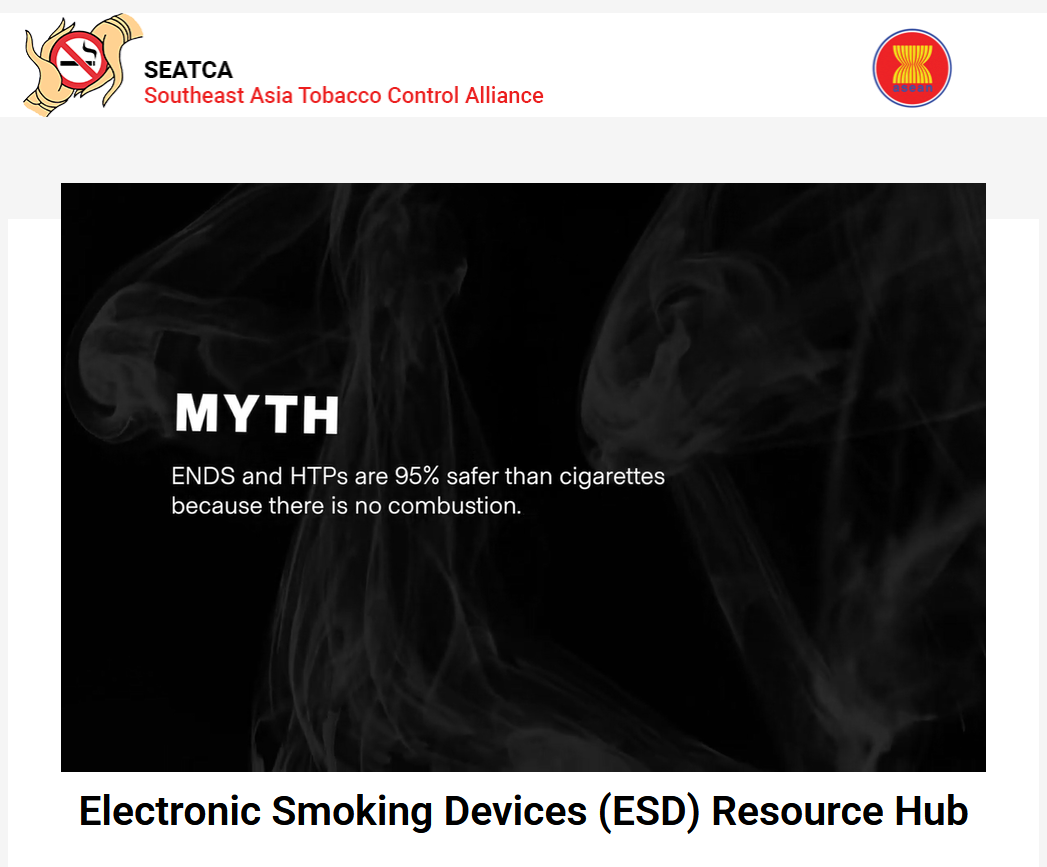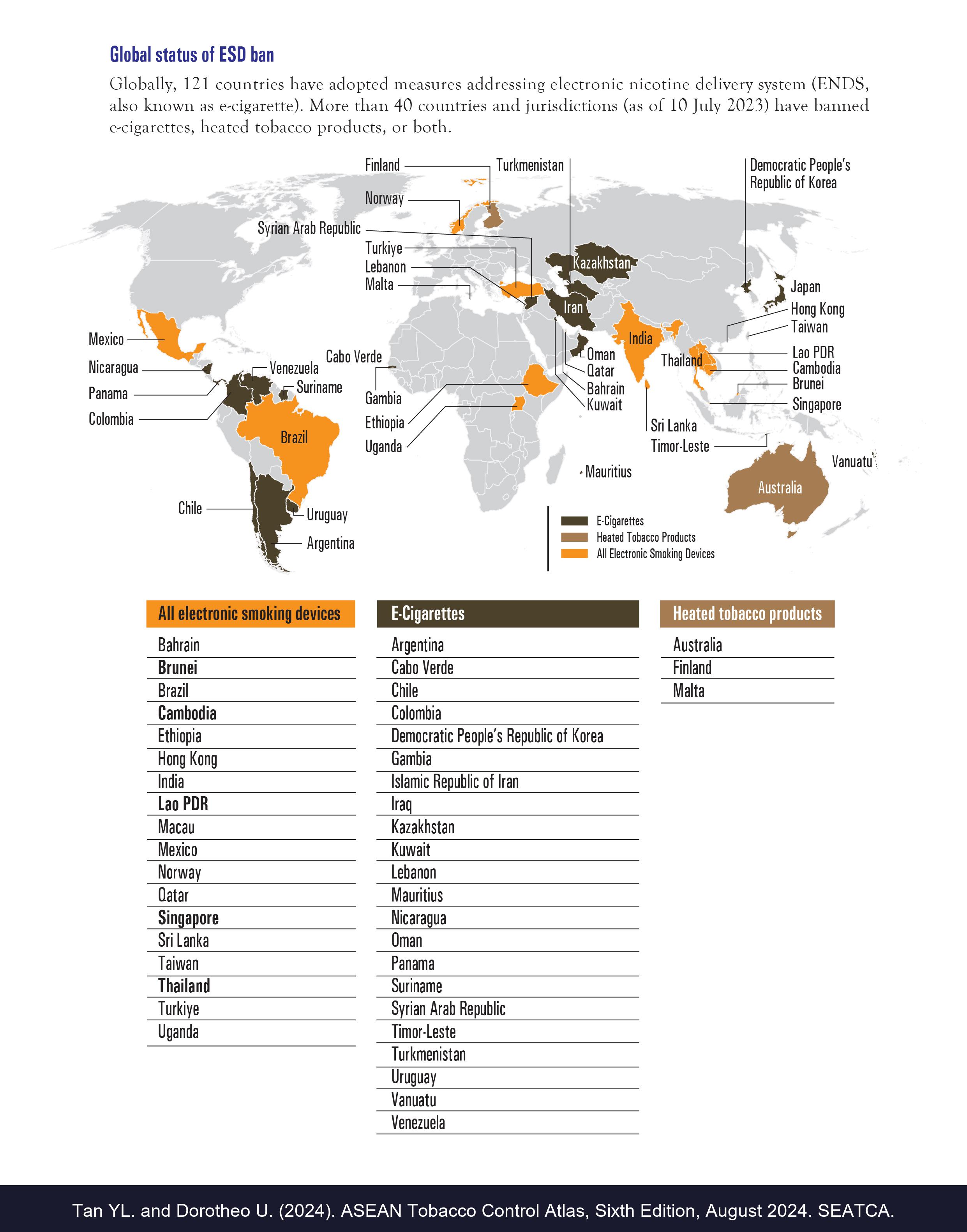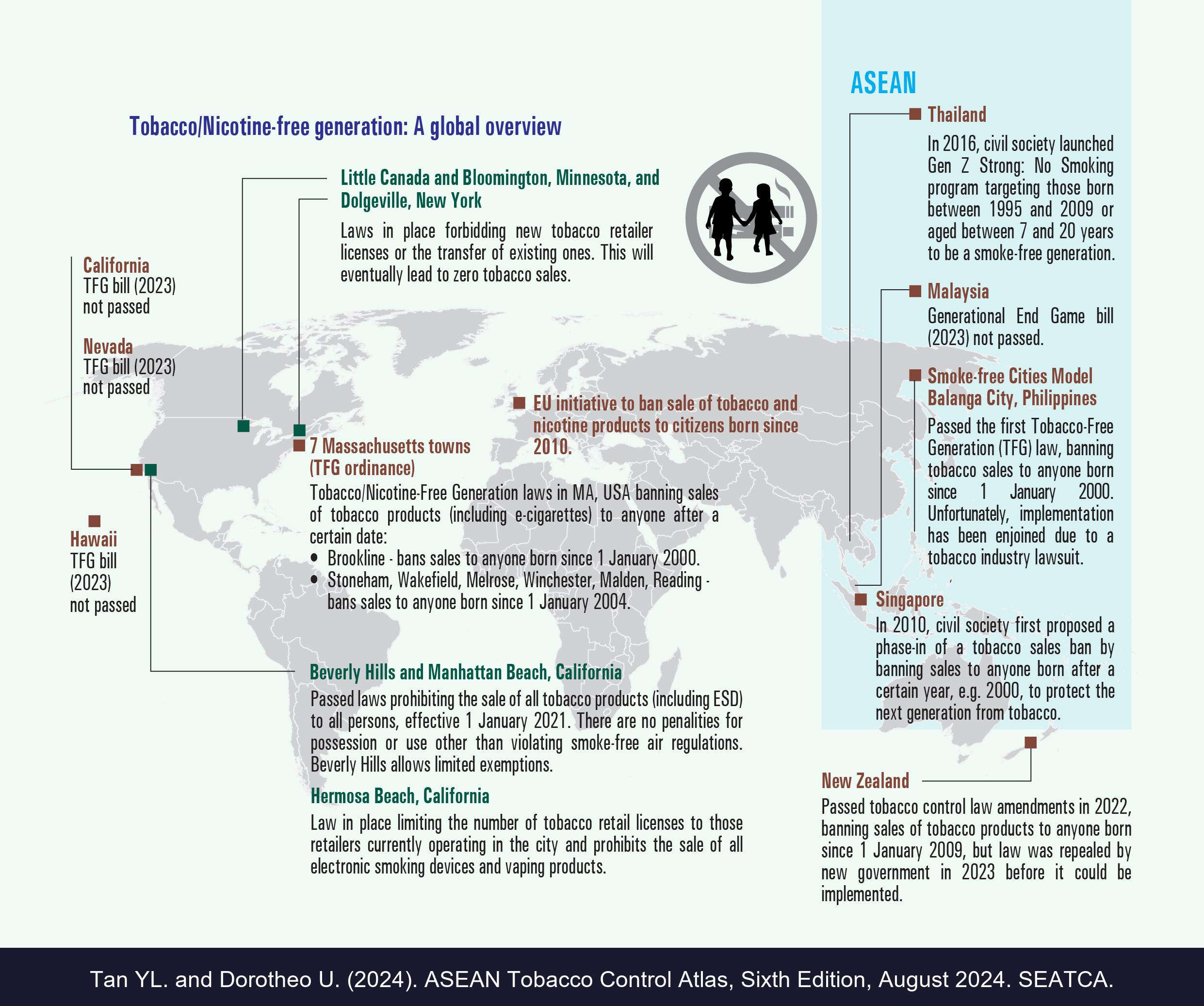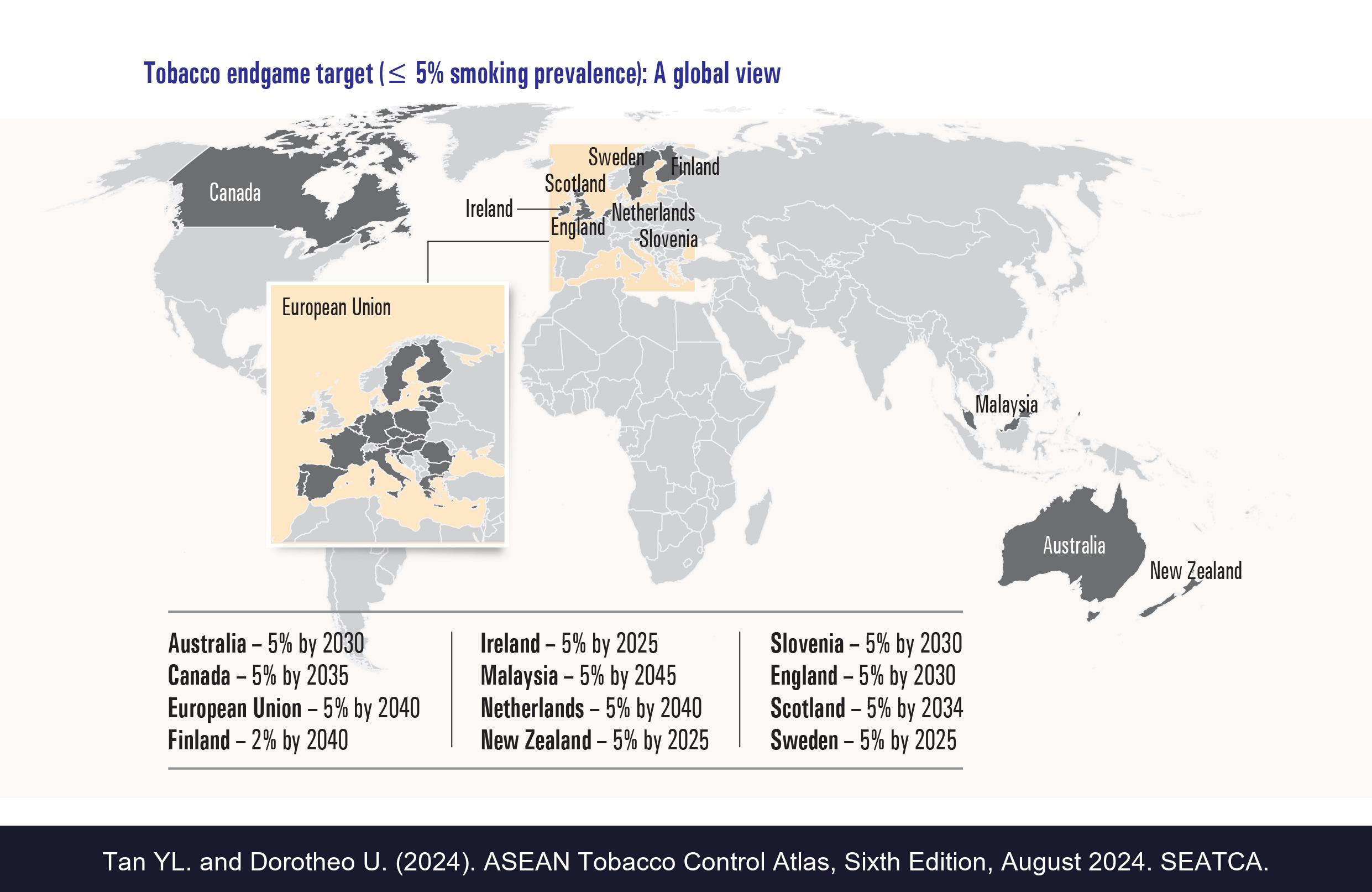Youth smoking therefore remains the front line of the tobacco
epidemic, as youths are more susceptible to tobacco marketing, and
nicotine addiction is more entrenched in the developing adolescent
brain. On average, most smokers start smoking before the age of
20.
The tobacco industry keeps inventing new ways to sell harm through
novel marketing schemes, attractive and colourful packaging, new
flavors, and new products to appeal to the young and first-time
smokers. In ASEAN, menthol and flavoured cigarettes are
unregulated and widely available. Single-stick cigarette sales,
which increase
accessibility to cigarettes, are banned in all but in three ASEAN
countries (Indonesia, Philippines, and Vietnam), while the sale of
kiddie packs (containing less than 20 sticks) is still allowed in
Indonesia and Philippines.
The emergence and rapid market growth of a new and wider range of
alternative nicotine products such as electronic nicotine delivery
systems (ENDS, which include e-cigarettes and are available in
thousands of flavours) and heated tobacco products (HTPs) are a
new challenge for preventing nicotine addiction and other health
harms. Such gadgets, with their sleek designs and flashy
marketing, easily
appeal to youths and increase the risk of transitioning to conventional cigarettes, and some countries have already seen a significant rise in teen use.
Globally, there are 121 countries have either banned or restricted
the sale of ENDS. Thirty four of these countries ban the sale of
ENDS, and the other 87 countries have adopted one or more
legislative measures to regulate ENDS, covering 3.3 billion
people. In ASEAN, five countries (Brunei, Cambodia, Lao PDR,
Singapore, and Thailand) already banned ENDS and HTPs.
Transnational tobacco companies also produce ENDS and HTPs and
promote these as being less harmful than conventional cigarettes
and as smoking cessation devices. Noting that there are no
long-term studies on the safety of these devices and insufficient
evidence of their benefit as tools for smoking cessation, the WHO
and some national health authorities, such as the Australian
National Health and Medical Research Council (NHMRC) and the US
National Academies of Sciences, Engineering, and Medicine (NAS),
have recommended a precautionary approach and action to minimize
harm to users and bystanders and to protect vulnerable groups such
as young people, until clear evidence of safety, quality and
efficacy are produced. For HTPs, the WHO recommends that these be
regulated similarly to other tobacco products.
This chapter also highlights initiatives to protect present and future generations from nicotine addiction and tobacco harms.
Ban TAPS of tobacco products and ESD (ENDS and HTPs) via internet in ASEAN
| Country | Tobacco products | ESD (ENDS and HTPs) |
|---|---|---|
| Brunei | Ban (2005) | Ban imitation products (2005) |
| Indonesia | No ban | No ban |
| Cambodia | Ban (2015) | Ban ENDS (2014), HTPs (2021) |
| Lao PDR | Ban (2010) | Ban (2020) |
| Malaysia | Ban (2004) | Ban HTPs (2020)*, ENDS (2024) |
| Myanmar | Ban (2006) | No ban |
| Philippines | Ban (2008) | Regulated (2022) |
| Singapore | Ban (1993) | Ban (2016) |
| Thailand | Ban (2017) | Ban (2017) |
| Vietnam | Ban (2013) | Ban (2025) |
*In Malaysia, the online sale of tobacco products was regulated under Regulation 10A, of the Control of Tobacco Product Regulation (CTPR), 2004 under the Food Act 1983. Heated tobacco product was classified as a cigarette in 2020, hence it was regulated similar to other tobacco products.
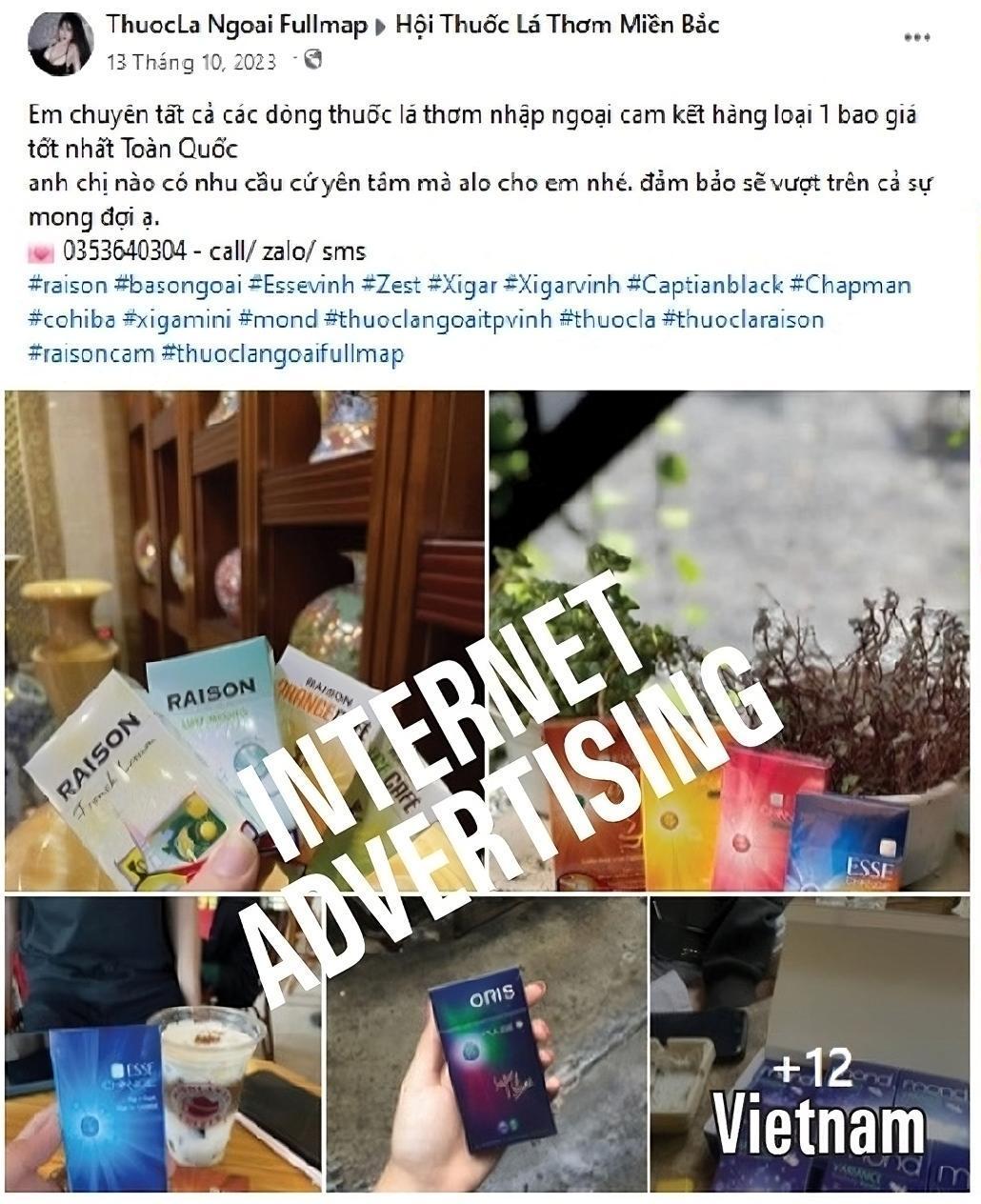
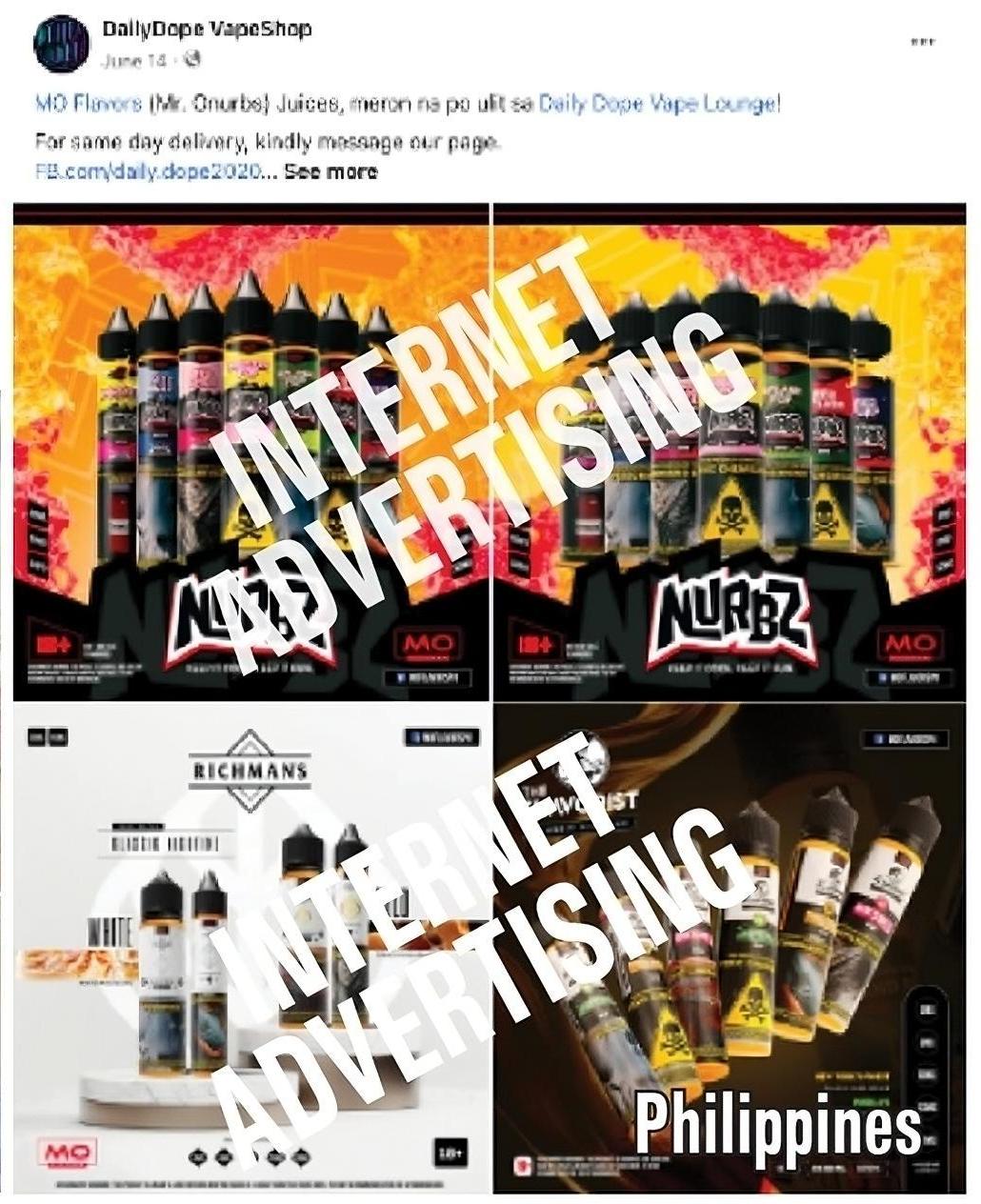
Countries with flavouring bans or restrictions: A global view
Minimum legal age for the purchase, possession, and use of tobacco
Raising the minimum legal age for tobacco use to at least 21 years old (ideally 25 years old) helps reduce youth initiation and protects the adolescent brain against nicotine addiction and harm to brain development.
Despite most countries banning sales to banning sales to minors, it is estimated 24 million children aged 13–15 years around the world smoke.
Ban the sale of kiddie packs (less than 20 sticks per pack) in ASEAN
| Kiddie packs | ||
|---|---|---|
| Brunei | Ban (2005) | |
| Cambodia | Ban (2015) | |
| Indonesia | No ban |

|
| Lao PDR | Ban (2009) | |
| Malaysia | Ban (2010) | |
| Myanmar | Ban (2006) | |
| Philippines | No ban |

|
| Singapore | Ban (2002) | |
| Thailand | Ban (2017) | |
| Vietnam | Ban (2016) |
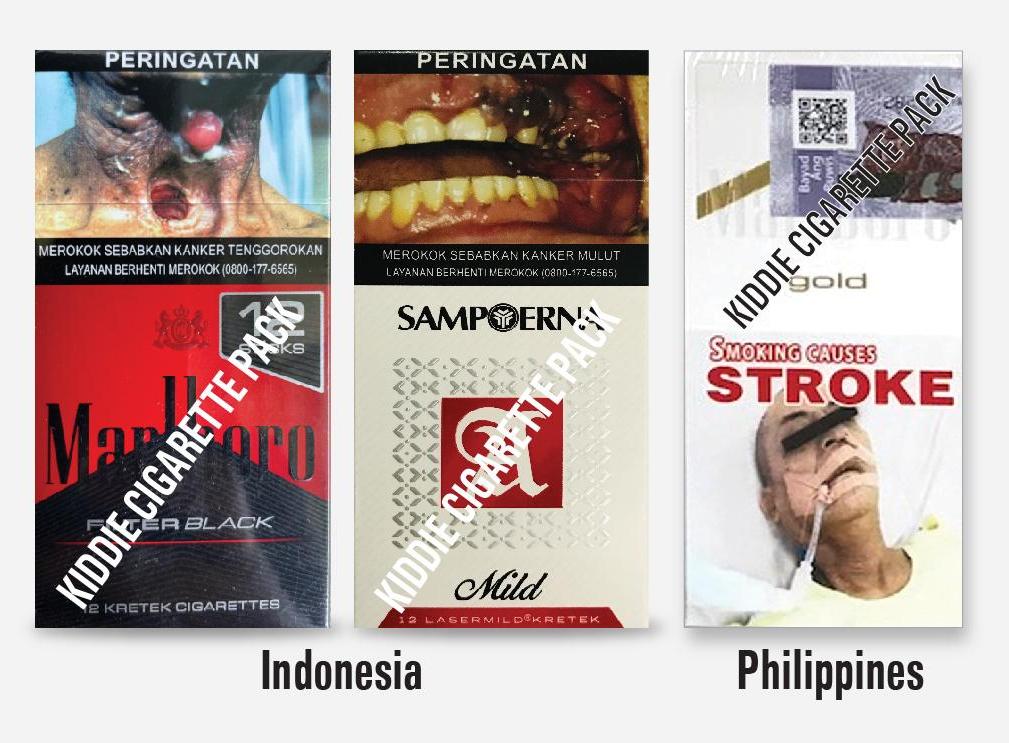
Ban the sale of tobacco products from vending machines and the distribution of free tobacco products
| Vending machines | Distribution of free tobacco products to the public | |
|---|---|---|
| Brunei | Ban (2005) | Ban (2005) |
| Cambodia | Ban (2005) | No ban |
| Indonesia | Ban (2012) | Ban (2012) |
| Lao PDR | Ban (2009) | Ban (2021) |
| Malaysia | Ban (2004) | Ban (2004) |
| Myanmar | Ban (2006) | Ban (2006) |
| Philippines | Ban (2003)* | Ban (2003) |
| Singapore | Ban (1993) | Ban (1993) |
| Thailand | Ban (2017) | Ban (2017) |
| Vietnam | Ban (2013) | Ban (2013) |
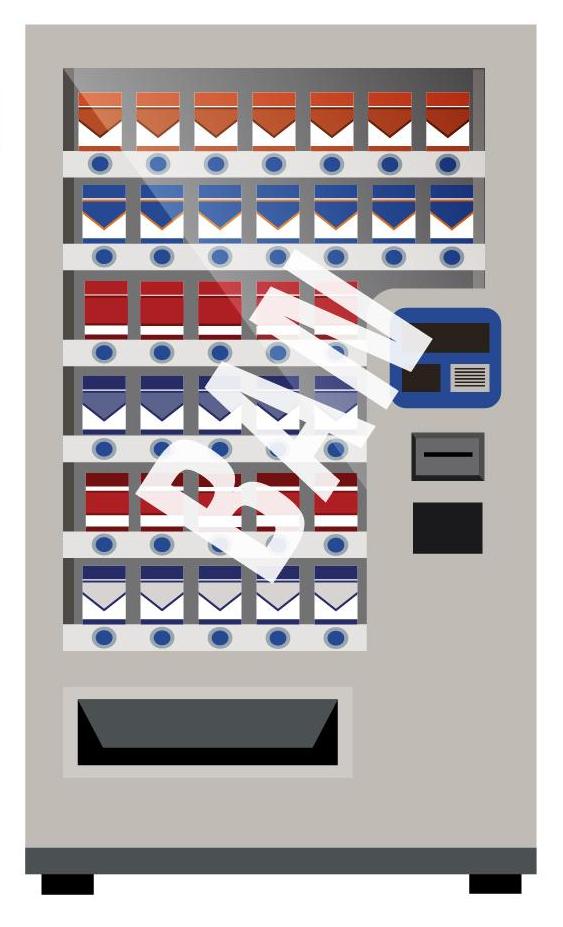
*Vending machine is banned except at point-of-sale establishment and unless there is an age verification mechanism.
Ban the sale or supply of toys or sweets that resemble tobacco products
| Ban (in which year) | No Ban | |
|---|---|---|
| Brunei | ✔ 2005 | |
| Cambodia | No ban | |
| Indonesia | ✔ 2012 | |
| Lao PDR | ✔ 2009 | |
| Malaysia | ✔ 2004 | |
| Myanmar | ✔ 2006 | |
| Philippines | ✔ 2003 | |
| Singapore | ✔ 1993 | |
| Thailand | ✔ 2017 | |
| Vietnam | ✔ 2013 |

5.6 million children alive today will ultimately die early from smoking if we do not do more to reduce tobacco use.
Status of Electronic Smoking Device (ESD) ban in ASEAN
| Country | Ban on ESD* (ENDS, HTPs and Shisha/hookah) | Regulated nicotine (and/or other) content/s of e-cigarettes | No ban |
|---|---|---|---|
| Brunei (2005) | ✓ | ||
| Cambodia (2014)** | ✓ | ||
| Lao PDR (2018) | ✓ | ||
| Singapore (2010) | ✓ | ||
| Thailand (2014) | ✓ | ||
| Indonesia | ✓ | ||
| Malaysia*** | ✓ | ||
| Myanmar | ✓ | ||
| Philippines | ✓ | ||
| Vietnam | ✓ |
*Electronic smoking device (ESD) means Electronic Nicotine Delivery Systems / Electronic Non-Nicotine Delivery Systems (ENDS/ENNDS), Heated Tobacco Products (HTPs), and other new and emerging smoking devices, including consumables, e.g. e-liquids and heat sticks.
**Cambodia National Authority for Combating Drugs passed a circular banning the importation, trafficking, sale, and use of HTP on 18 March 2021.
***E-liquid and gel of electronic cigarette was subjected to an ad valorem excise tax of 10% and an excise duty of MYR 0.40 (USD 0.08) per millilitre of e-liquid starting 1 January 2021 (for non-nicotine) and 1 April 2023 (for nicotine). The Malaysian National Fatwa Council has declared all vapour and shisha products as "haram" (forbidden in Islam). Five out of 13 states (Johor, Kelantan, Kedah, Penang, and Terengganu) have banned the sale of e-cigarettes under the state jurisdiction.
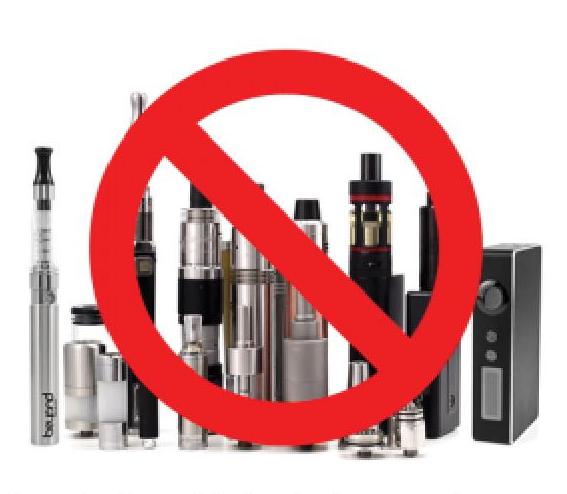
Singapore: Ban on emerging tobacco products
In 2014, Singapore banned emerging tobacco products including smokeless cigars, smokeless cigarillos and smokeless cigarettes; dissolvable tobacco or nicotine; any product containing nicotine or tobacco that may be used topically for application, by implant or injection into any parts of the body; and any solution or substance of which tobacco or nicotine is a constituent that is intended to be used with an electronic nicotine delivery system or a vaporizer (e-cigarettes); nasal snuff, oral snus gutkha, khaini and zarda, as stipulated in the Tobacco (Control of Advertisements and Sale) (Prohibited Tobacco Products) Regulations 2014.
Electronic Smoking Devices (ESD) Resource Hub
SEATCA's ESD resource hub serves as a one-stop resource to help you tackle the problem of ESDs, including electronic nicotine delivery systems and heated tobacco products. It provides access to a collection of scienctific evidence - research papers, publications, reading materials - as well as advocacy materials (powerpoint presentations, social media cards, videos, and others), that you can use and adapt to your own campaigns. To know more, visit the resource hub and check out the new materials on ESDs here, https://seatca.org/esd-resource-hub/
Global status of ESD ban
Globally, 121 countries have adopted measures addressing electronic nicotine delivery system (ENDS, also known as e-cigarette). More than 40 countries and jurisdictions (as of 10 July 2023) have banned e-cigarettes, heated tobacco products, or both.
Countries that have no ban in place, but have adopted one or more measures either fully or partially to restrict them
Prohibiting the use of ENDS in indoor public places
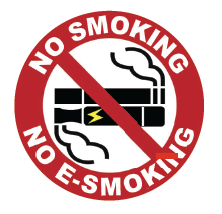
- 42 countries completely ban the use of ENDS in all indoor public places, workplaces, and public transport.
Health warnings applied to packaging of ENDS devices and/or e-liquids
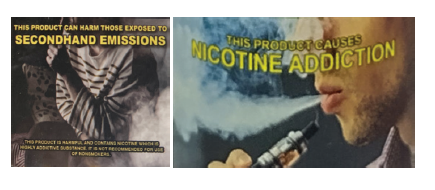
- 64 countries impose the display of health warnings (on either the packaging of ENDS devices, e-liquids, or both)
Prohibiting the advertisement, promotion, and sponsorship of ENDS
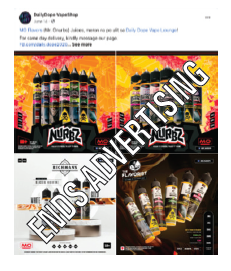
- 105 countries do not ban or restrict the advertising and promotion of ENDS, including half (17) of the 34 countries where the sale of these products is banned.
Minimum age restrictions applied to the sale of ENDS
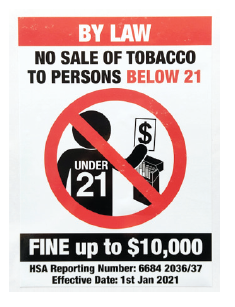
- Only 73 (45%) out of 161 countries ban the sale of ENDS to minors.
- These 73 countries limit their sale to a minimum age
- 18 years of age in 65 countries
- 19 years of age in one country
- 21 years of age in seven countries
Ban on flavours (to reduce the appeal of ENDS products to children and adolescents)
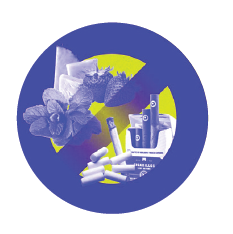
- Four (4) countries have adopted a ban on characterizing flavours in ENDS (Finland, Hungary, Lithuania, Montenegro)
- Nine (9) countries ban only selected flavours or permit specific flavours (China, Denmark, Egypt, Estonia, Germany, New Zealand, Philippines, Saudi Arabia, Ukraine).
- The European Union Tobacco Products Directive revision of 2014 set out to ban ingredients that increase inhalation. This may be interpreted to include menthol flavours.
Tobacco/Nicotine-free generation: A global overview
Tobacco endgame target (≤ 5% smoking prevalence): A global view
Tobacco-free generation in ASEAN
Philippines (Balanga City), Singapore, and Thailand
Singapore: Tobacco-free Generation 2000 (TFG 2000)
In 2014, Singapore banned emerging tobacco products including smokeless cigars, smokeless cigarillos and smokeless cigarettes; dissolvable tobacco or nicotine; any product containing nicotine or tobacco that may be used topically for application, by implant or injection into any parts of the body; and any solution or substance of which tobacco or nicotine is a constituent that is intended to be used with an electronic nicotine delivery system or a vaporizer (e-cigarettes); nasal snuff,
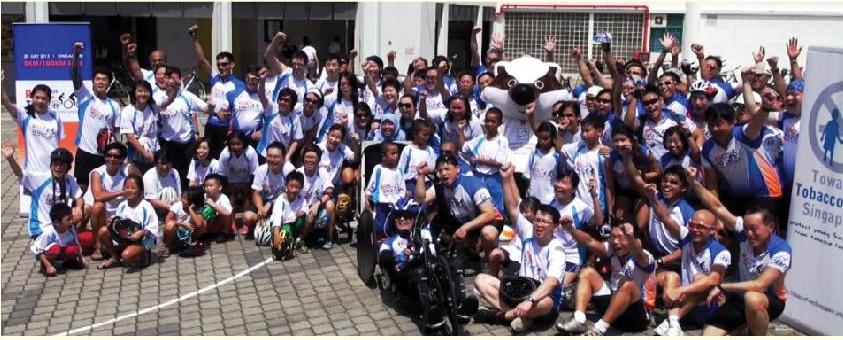
oral snus gutkha, khaini and zarda, as stipulated in the Tobacco (Control of Advertisements and Sale) (Prohibited Tobacco Products) Regulations 2014.
Philippines: Balanga – World’s First Tobacco-Free Generation City
The tobacco-free generation concept prohibits the sale of any tobacco products
including electronic nicotine delivery systems (ENDS) and other similar products to any citizen born on or
after 01 January 2000 in the City of Balanga. This was enforced through the enactment of Tobacco-Free
Generation End-Game Strategy Ordinance of Balanga City, Bataan in 2016.
On 21 July 2017, the
Philippine Tobacco Institute (PTI), a trade association of cigarette manufacturers in the Philippines
filed a petition for prohibition against Balanga City on the grounds of pre-emption, alleging prohibitions
delineated in the Comprehensive No-Smoking Ordinance - CNSO (prohibiting sales and use within a 3km radius
of the city's university town) supersede and therefore violate national regulations established by the
Tobacco Regulation Act of 2003. The lower court has ruled in favour of the PTI.
On 21 May 2018,
PTI filed another legal challenge against the city’s 2016 Tobacco Free Generation Ordinance banning the
sale of tobacco products to all Balangueños born on or after 1 January 2000.
On 24 June 2019,
Balanga City passed new legislation – New Comprehensive Tobacco and Nicotine Regulation for the Protection
of Health and Welfare Ordinance.
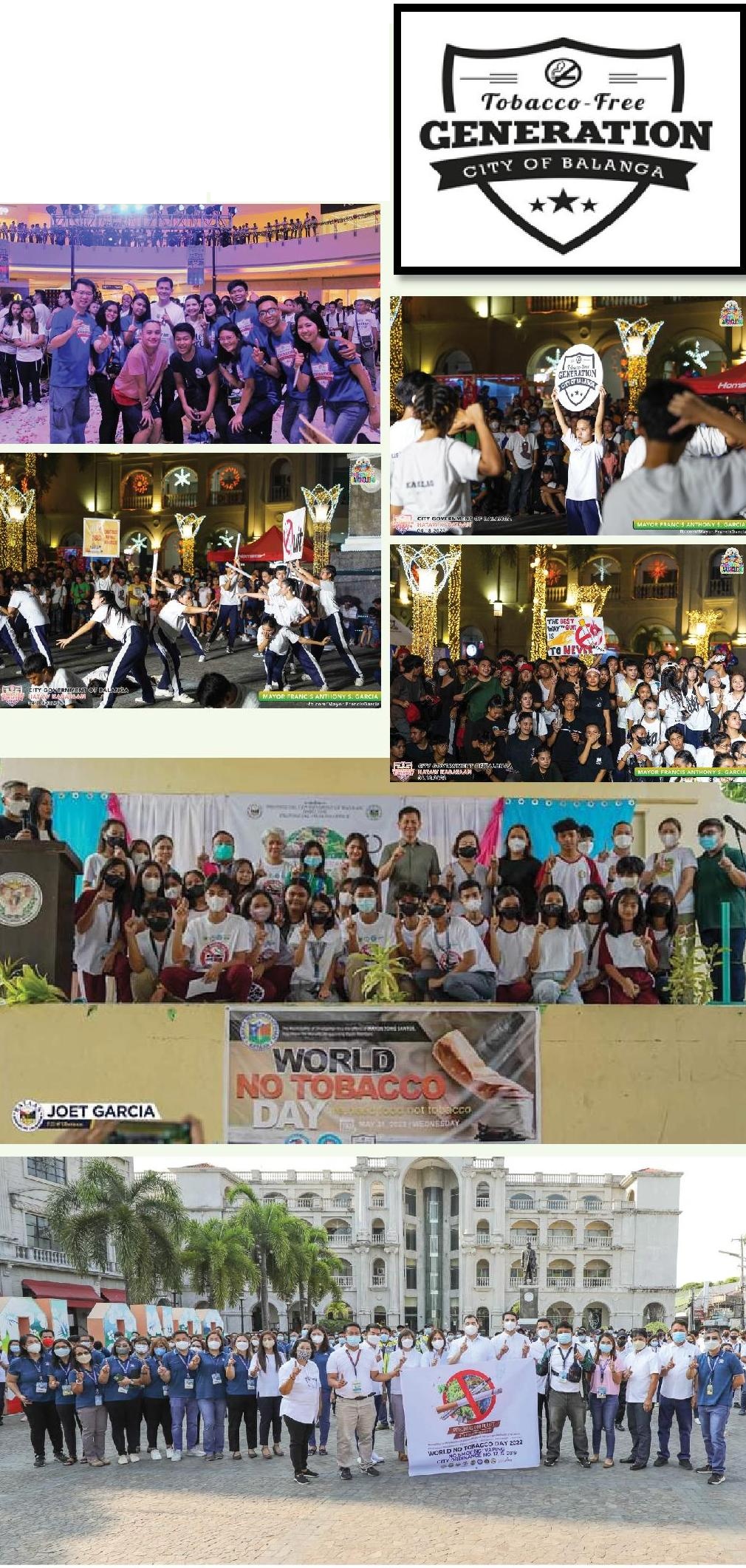
Thailand: Gen Z Strong (2017-2024)
Thailand civil society (ASH Thailand) in collaboration with Ministry of Public Health launched Gen Z
Strong: No Smoking program targeting those born between 1995 and 2009 or aged between 7 and 20 years old
in 2016 to be a smoke-free generation. Social media and digital media are used to convince the targeted
youths not to start smoking and to actively participate in advocacy campaigns.
In 2017, about 100
youth leaders (from seven youth groups) and 9 leading organizations were engaged to support, promote and
share the Gen Z project with their network through a series of workshops and trainings for 4,000 youths
across the country. The youth groups continued to support the pilot projects in selected ten provinces,
including Phuket, Krabi, Khonkhen, Srisaket, Ubonratchathani, Nakhonratchasima, Pitsanulok, Chiangmai,
Petchaboon, and Maehongson.
In 2019, a new initiative ‘MPOWER GEN Z’ was designed to build and
strengthen the capacity of youth groups in different areas including media (writing news, creating video
clips) and tobacco industry monitoring and surveillance through a ‘Gen Z Academy Programs’.
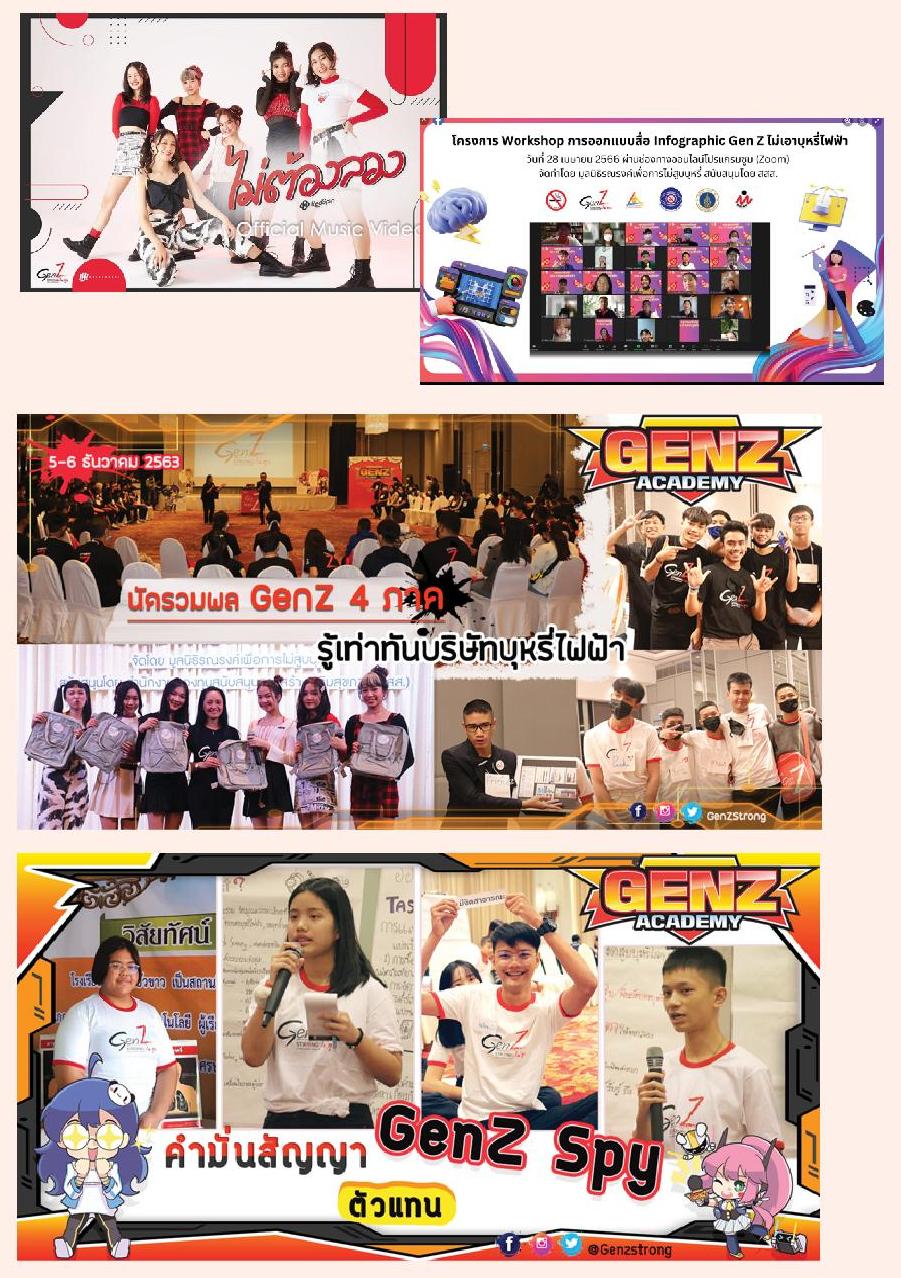
Four Gen Z Academy workshops were held with a participation of 356 young leaders across ten provinces between 2019 and 2021. At present, Gen Z membership has grown from 1,501 (in 2022) to 6,000 in 2024 from 28 provinces across Thailand.
Key activities implemented to support the Gen Z project include:
- Partnership with Ministry of Education on the establishment of 223 Gen Z Gen Strong Club in education facilities (North region: 130, Central region: 9, Northeast region: 69, South region: 15)
- Promote ‘World No Tobacco Day’ slogan in schools
- Provide capacity building through teachers’ network for smoke-free school using activity-based learning approach and youth development programme (e.g. development of Gen Z academy curriculum, Hackathon 4 Health, online training of design sticker for chat application)
- Organize knowledge sharing with the Gen Z Gen Strong members
- Engagement in social media platforms (Facebook/ Twitter/Instagram/
YouTube/ Tik Tok/ LINE)
- To establish a communication and dissemination channel reaching out and connecting with Gen Z network at all times.
- To disseminate information on tobacco control and encouraging Gen Z youth in the network to participate in the creative activities (e.g. infographic workshop “Say No to electronic cigarettes”, cover dance, Tik Tok, video clip and short movie, doodle art competition)
- To connect and link information to other social media channels in a quick and effective manner.
- Connecting with internet idol and influencer as motivation and inspiration for youths to engage in the Gen Z activities.
- Developing and supporting the production of new materials (T-shirt/pen/face mask/bag)
Support Tobacco Control in ASEAN
Your donation helps strengthen tobacco control efforts across
Southeast Asia, funding critical programs that save
